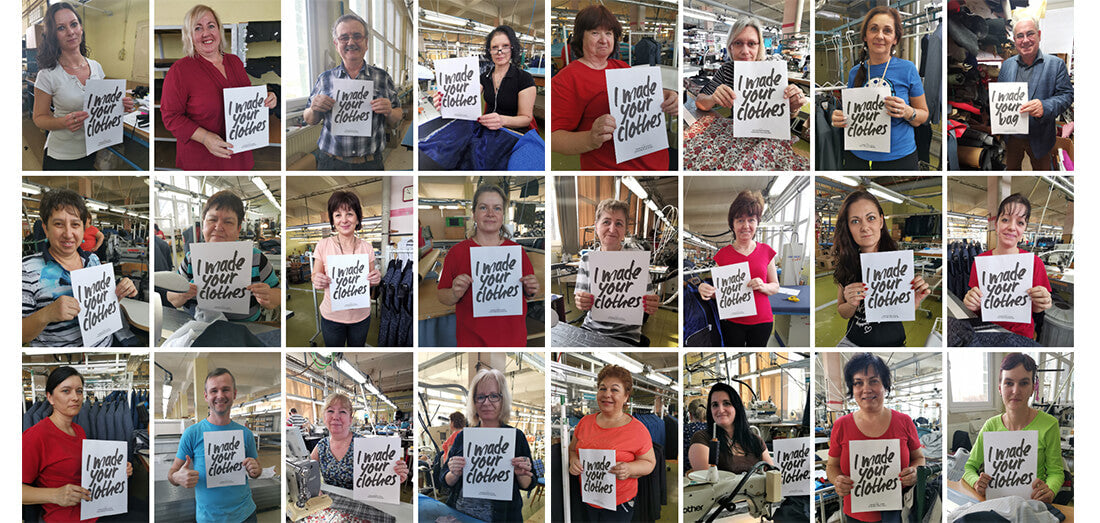Today, on Earth Day , Fashion Revolution Week begins. A week in which we remember the victims of the horrific collapse of a garment factory in Bangladesh (in 2013), which killed more than 1,000 people and injured hundreds more, and, even more intensely than the rest of the year, we fight for transparency, ethics and sustainability in the fashion industry.
"If someone wanted to live 100% sustainably from a fashion perspective, they would have to go naked their whole life," says Martina Mareková Kuipers , coordinator of the Fashion Revolution movement in Slovakia , and continues: "There's no need to exaggerate, zero waste is really a trend now, but we need to realize that whatever we do, some trace of us will always be left behind. It's especially important to think before buying anything, even clothes."
Organic, eco and other trends
Zero waste, ecology and a sustainable lifestyle are really a trend, we have been fighting plastics for years, we try to shop in our own bags, take vegetables in retro mesh bags, pastries in canvas bags, we carry water in our own bottles (ideally made of glass), we buy food whose origin we know. A similar mindset is gradually coming to the fashion industry, which is one of the dirtiest industries in the world. They say that clothes make the man, and thanks to them you can often guess a person's social status, position or taste. Fashion trends are an important part of many people's lives, but even those who are not interested in trends have to dress. Therefore, it is important, just like with the aforementioned foods, to think about what we wear and where it comes from . [caption id="attachment_8280" align="alignnone" width="1100"]
When buying any clothing, think about
Everyone has to start with themselves. "Someone doesn't care that someone else is suffering during the production of their clothes, but they should at least care that if they wear something that is made of poor-quality materials, and moreover processed in a way that is harmful to their health, it affects them. Those substances go into their skin. So they are not only harming the earth, soil, water, but also their health..." Simona opens another topic.
#whomademyclothes
The question “Who made my clothes?” has been heard more and more since the global movement began. In April 2018, #whomademyclothes resonated with 275 million people around the world, including Slovakia. It expresses people’s commitment to learning as much information as possible about the origin of their clothes and the conditions in which they were made. "Small designers and small brands approach this responsibly. The smaller the brand, the more transparent it is, it's basically their marketing, thanks to which they sell themselves. But even larger brands can show something from behind the scenes of their production and in the age of social networks relatively easily," says Martina. ( We write about the origin of the Alain Delon clothing brand in several articles. )
Clothing cycle
The goal of the fashion revolution is for brands and consumers to start thinking more about the entire life cycle of clothing, from how it is produced, how it travels to stores and consumers, to what happens to it when you no longer wear it and decide to exclude it from your wardrobe. You always have an alternative. If you have clothes in your closet that are almost unworn, but you know that you will no longer wear them, you can pass them on to a friend, you can take them to a second-hand store, where they will find a new owner or breathe new life into them (for example , NOSENE creates the Renewals collection ) or participate in so-called SWAPs, in which participants can exchange their clothes with each other.
Fashion Revolution Week 2019 in Slovakia
Fashion Revolution Week in Slovakia will kick off with a panel discussion in Berlinka on Tuesday, April 23 at 6:00 p.m. , which will also include our brand Alain Delon. In addition to us, the invitation to Barbara Jagušák's Fashion Revolution Talk was accepted by sustainable wedding dress designer Zuzana Kedroňová from Yoora Studio, Juraj Kunák, representative of the Slovak company Ekocharita, and Zuzana Ryšavá, Fashion Revolution coordinator for the Czech Republic. [caption id="attachment_8279" align="alignnone" width="1100"]

